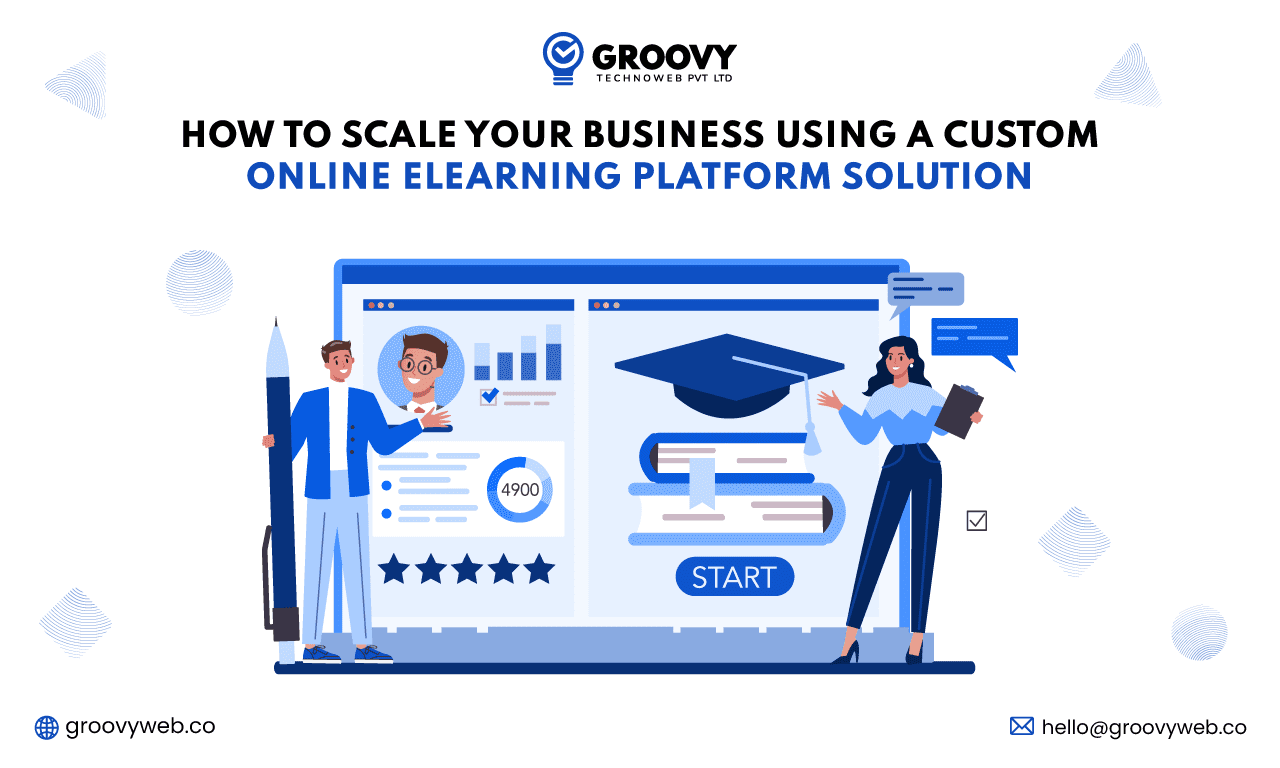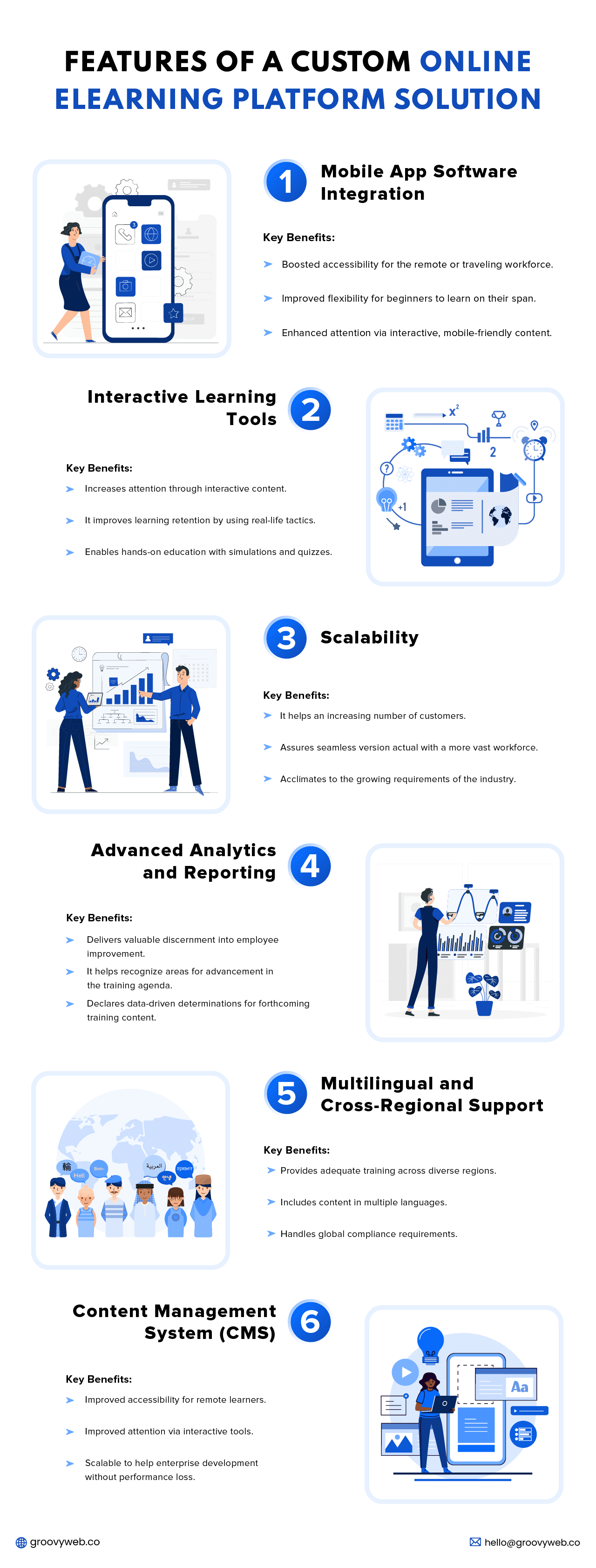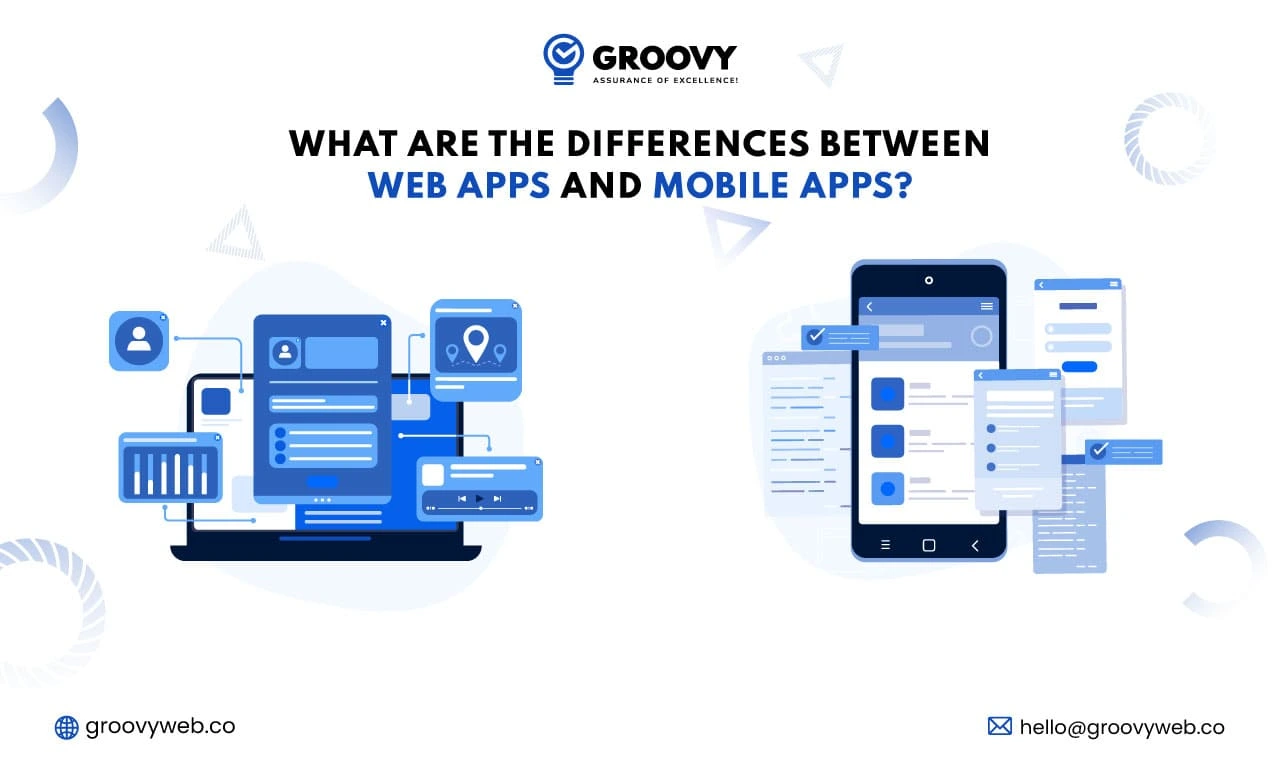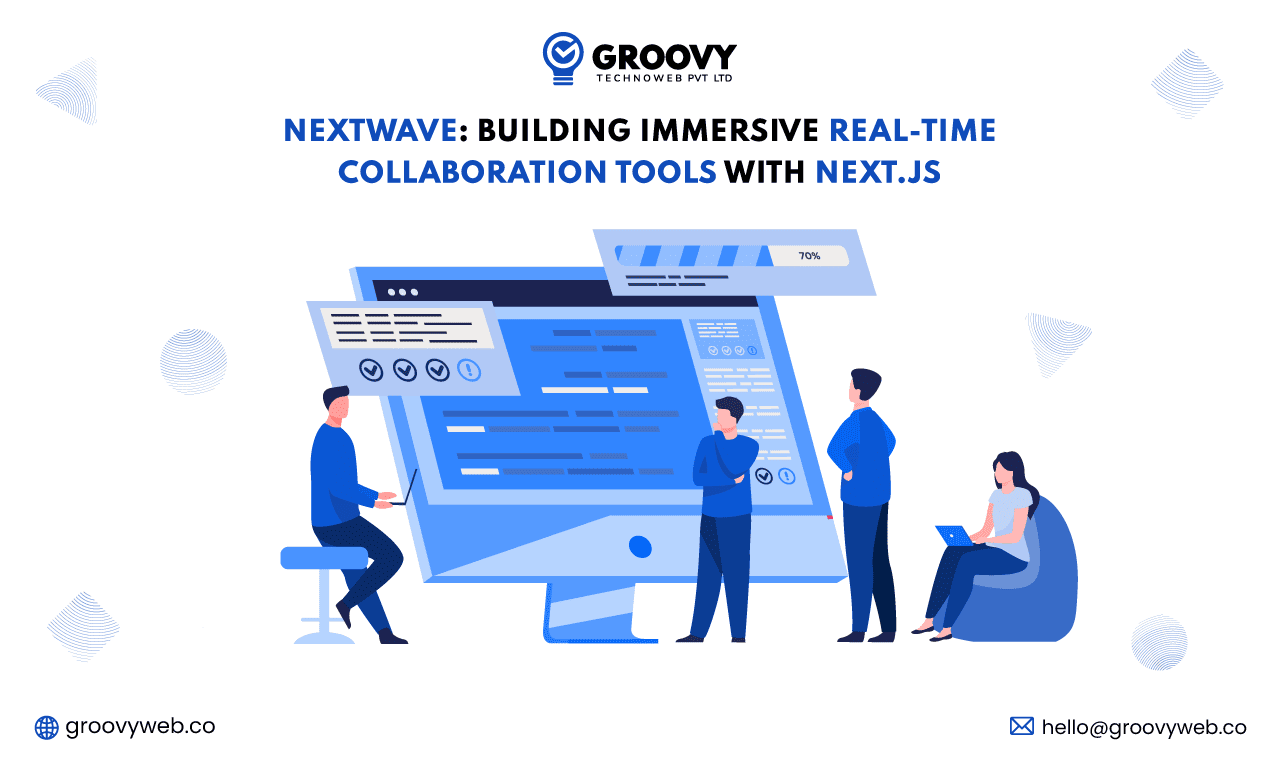How to Scale Your Business Using a Custom Online eLearning Platform Solution
Rahul Motwani
September 26, 2024 263 Views
Quick Summary : Scaling your business through a custom online eLearning platform enables efficient employee training, streamlines processes, and promotes growth. Tailored platforms provide flexibility and allow businesses to create personalized learning experiences, helping employees develop necessary skills. With interactive tools, mobile accessibility, and data-driven insights, eLearning solutions ensure consistency and adaptability for growing teams. By implementing a customized solution, your business can enhance employee retention, track progress effectively, and maintain scalability, leading to long-term success and an improved competitive edge.
Growing a firm usually involves enhancing operating efficiency, boosting workforce abilities, and adopting technologies that facilitate procedures. An adequate approach to accomplish these objectives is by embracing a custom online eLearning platform solution. These platforms enable enterprises to deliver scalable, constant, and fascinating training experiences to employees, clients, and counterparts. In this blog, we’ll discover how enterprises can scale efficiently utilizing eLearning platforms and critical methods for success.
How to Scaling with eLearning Solutions?
As enterprises develop, training and growth play a crucial part in supporting operating efficiency and ensuring that employees are well-prepared for the challenges. Standard training techniques, such as workshops and in-person discussions, are often inadequate for large-scale industries. A custom online e-learning platform solution delivers a trendy option catering to a growing workforce while underestimating costs. An education technology solution enables constant education and delivers access to scope from any area. Whether you need to onboard new employees, upskill your group, or train clients on your outcomes and services, elearning is a scalable solution.
Why Businesses Need Custom eLearning Solutions?
While off-the-shelf eLearning platforms can offer generic training, they usually lack the flexibility and professionalization needed by developing companies. Custom online eLearning platform solutions are created to handle distinct business requirements and hurdles, making them a perfect alternative for businesses seeking to rise.
Tailored Learning Content
A custom online eLearning platform solution enables companies to design training scope that contemplates their distinctive objectives, values, and industry needs. This ensures that employees acquire training that is not only appropriate but also aligned with their positions and commitments.
Improved Employee Retention
A personalized knowledge experience improves employee attention, guiding to higher retention rates. Employees who assume their effort is already prioritized can also stay with a firm, decreasing turnover and saving the costs of hiring and training new employees.
Data-Driven Insights
Custom online learning platforms have analytical tools that track employee improvement and learning outcomes. By studying this information, companies can specify agility gaps, gauge the efficacy of their training programs, and make knowledgeable decisions on how to enhance them.
Essential Features of a Custom Online eLearning Platform Solution

Specific features are crucial to ensure the victory of a custom online elearning platform solution. These attributes not only improve the education experience but also offer companies the tools required to boost efficiency.
1. Mobile App Software Integration
With today’s remote and portable workforce, including mobile app Development Software in your e-learning platform is vital. Mobile learning delivers flexibility, enabling employees to finish training comfortably, even on the go. This feature mainly helps businesses with distributed groups across diverse time zones.
Key Benefits:
- Boosted accessibility for the remote or traveling workforce.
- Improved flexibility for beginners to learn on their span.
- Enhanced attention via interactive, mobile-friendly content.
2. Interactive Learning Tools
Attention is vital to prosperous learning. Custom eLearning platforms should contain interactive tools such as examinations, simulations, and gamification features that make education more exciting and satisfying. These tools also enhance learning retention by letting employees explain what they have understood in real-world systems.
Key Benefits:
- Increases attention through interactive content.
- It improves learning retention by using real-life tactics.
- Enables hands-on education with simulations and quizzes.
3. Scalability
As your business evolves, your eLearning platform should be capable of rising with it. A custom online eLearning platform solution should adapt to an increasing number of customers without compromising the version. This scalability means that you can onboard new employees and deliver constant practicum without any technical complications.
Key Benefits:
- It helps an increasing number of customers.
- Assures seamless version actual with a more vast workforce.
- Acclimates to the growing requirements of the industry.
4. Advanced Analytics and Reporting
Data is necessary for tracking the improvement and significance of training agendas. Custom eLearning platforms have built-in analytics tools that deliver acuities into learner performance, lesson fulfillment rates, and agility growth. This information can be utilized to evaluate the triumph of your training endeavors and determine scopes for refinement.
Key Benefits:
- Delivers valuable discernment into employee improvement.
- It helps recognize areas for advancement in the training agenda.
- Declares data-driven determinations for forthcoming training content.
5. Multilingual and Cross-Regional Support
For industries that work worldwide, multiple language services are essential. A custom eLearning portal development solution can deliver lessons in various languages, providing that employees across numerous areas acquire practical training. This is especially necessary for adherence training, where comprehending local constraints is vital.
Key Benefits:
- Provides adequate training across diverse regions.
- Includes content in multiple languages.
- Handles global compliance requirements.
6. Content Management System (CMS)
Creating a custom online eLearning platform solution needs basic features to optimize education and fulfill industry essentials. These features improve accessibility, attention, and scalability, providing efficient and flexible learning conditions.
Key Benefits:
- Improved accessibility for remote learners.
- Improved attention via interactive tools.
- Scalable to help enterprise development without performance loss.
How to Build a Custom eLearning Portal Development Solution?
To completely reap the advantages of a custom online eLearning platform solution, industries are required to track a streamlined performance approach. Below are the steps involved in designing and deploying an adequate platform.
- Assess Business and Learning Needs
Before designing a custom eLearning platform, it’s essential to consider your business’s education and growth requirements. Recognize the critical areas where training is needed, such as onboarding, skillfulness growth, or adherence training. This review will drive the structure of your platform.
- Select the Right Education Technology Solution
Selecting the right education technology solution is important for the success of your eLearning platform. Confirm that your chosen platform is consistent with your business’s necessities and can rise as your company raises. Look for components such as content authority, analytics, and mobile assistance.
- Design Custom Learning Content
Tailor your training scope to the exact essentials of your industry. This could possess industry-specific facilities, role-based learning courses, or real-world strategies appropriate to your employees. By designing custom content, you ensure that your training is in line with your business goals.
- Incorporate Interactive and Assessment Tools
Enclose interactive features such as quizzes, simulations, and case studies to contend employees and improve education retention. Further, reviews are essential for assessing the significance of your training schedule and determining areas where added action is a must.
- Test the Platform
Before setting up your custom eLearning platform, execute a trial run with a small batch of customers. This enables you to pinpoint technical problems and collect reviews on the user experience. Develop any required adjustments before a full-scale rollout.
- Launch and Monitor Progress
Once your platform is live in the world, observe its working process via built-in analytics tools. Trace learner advancement, course culmination rates, and reviews to confirm that the platform is fulfilling the demands of your business. Frequent updates and advancements will make the platform suitable and adequate.
Strategies to Maximize the Impact of Your Custom eLearning Solution
Executing a custom eLearning platform independently is not sufficient to secure success. You must also adopt strategies to ensure that the platform delivers maximum impact on your business:
Incentivize Learning
- Motivate employees to finish courses by proposing bonuses, certificates, or publicity.
- Utilize gamification to encourage learners and build a competitive atmosphere.
Regularly Update Content
- Ensure that your courses stay relevant by updating them with the latest industry trends and company policies.
- Add new modules to keep employees engaged and improve their skills over time.
Track and Analyze Progress
- Use built-in analytics tools to monitor how well employees are progressing.
- Adjust the platform and content based on insights from learner performance data.
Integrate with Other Business Systems
- Connect your eLearning platform with HR systems for better alignment in employee performance reviews and promotions.
- Integration helps ensure that learning goals align with business objectives.
Foster a Learning Culture
- Enable constant learning and growth as a feature of your firm culture.
- Inspire leaders and supervisors to partake in eLearning to form an example for employees.
The Role of Mobile App Software in eLearning
An essential benefit of current eLearning platforms is the integration of mobile app software, which allows employees to access training materials anywhere, anytime. This is especially crucial for businesses with a remote or mobile working style. Key advantages of employing mobile eLearning when you develop your own mobile app include enhanced accessibility, flexibility, and engagement for learners
Flexibility
- Learners can employ study materials in their program, making it more comfortable to suit retaining into their workday.
Accessibility
- Employees in remote places or those often traveling can even partake in crucial training sessions.
Increased Engagement
- Mobile learning usually employs bite-sized modules and multimedia content, which holds learners committed and assists with retention.
Future of eLearning: Trends and Innovations
As the need for online eLearning platform solutions rises, technological innovations persist to shape the fortune of eLearning. Some approaching trends possess:
Machine Learning and Artificial Intelligence (AI)
- AI can customize learning experiences by discovering trainee details and adapting content to their demands.
Augmented Reality (AR) and Virtual Reality (VR)
- These technologies provide extensive learning experiences, specifically for industries requiring hands-on training.
Microlearning
- Bite-sized content focusing on distinct subjects is becoming popular for its efficiency and comfort of consumption.
Gamification
- By including game-like features, such as points, leaderboards, and bonuses, trainees are better inspired to finish courses.
Cloud-Based Platforms
- Cloud-based eLearning platforms present scalability and flexibility, enabling businesses to add users and courses easily.
Conclusion
A custom online eLearning platform solution is a vital tool for industries seeking to rise by offering constant, adaptable, and efficient training agendas. By using an education technology solution and mobile app software, businesses can facilitate steady learning, enhance employee rendition, and stay competitive worldwide. By executing the proper methods and maintaining the latest trends in eLearning, organizations can gain the result of their training endeavors and assure long-term development.
Written by: Rahul Motwani
Rahul Motwani is an experienced Project Manager with a demonstrated history of working in the information technology and services industry. He started his career as a Backend developer and currently has his hands-on managing projects at Groovy Web. He is a strong program and project management professional with a Bachelor's degree focused on Computer Application.
Frequently Asked Questions
We hope these clear your doubts, but if you still have any questions, then feel free to write us on hello@groovyweb.coWhat are the key features of a successful eLearning platform for businesses?
Essential features of a thriving eLearning platform possess mobile app software incorporation, scalability, interactive tools, and cutting-edge analytics. Mobile incorporation lets employees access training remotely, while scalability helps an increasing workforce. Interactive tools, like quizzes and simulations, boost attention, and analytics deliver perspicuity to employee advancement. Customization choices align the platform with business-specific requirements, making it more accessible to provide targeted training and continually enhance based on performance information.
How can mobile app software improve employee training on an eLearning platform?
Mobile app software improves the accessibility and flexibility of eLearning platforms. Employees can finish training courses from any place in their comfort, which is especially helpful for remote groups. This flexibility enhances concentration and fulfillment rates, keeping employees up-to-date with training. By helping mobile learning, businesses can adapt various learning types, allowing employees to be ready on the go making training seamless and scalable as the industry extends.
What role does eLearning portal development play in scaling business training programs?
eLearning portal development allows businesses to customize training solutions to satisfy distinct development requirements. These portals deliver an organized, user-friendly experience on the interface where employees can access all required training course materials. Scalable portals can manage a growing number of trainees and enable the easy acquisition of new content. Custom development assures that the portal is in line with your business goals, delivering tailored learning approaches that help continued development and growing training needs.
How do analytics and reporting in an eLearning platform support business growth?
Cutting-edge analytics and reporting tools in an online eLearning platform offer acumen into employee advancement, course fulfillment rates, and learning results. These metrics let businesses evaluate the significance of training schedules and recognize learning gaps or underperforming areas. With data-driven insights, companies can optimize their training procedures, assuring employees obtain the required skillfulness to contribute to business growth and performance advancements over the period.
Related Blog

Sagar Patel
What are The Differences Between Web Apps and Mobile Apps?
Web App Development 08 Jan 2025 21 min read
Rahul Motwani
How Much Does It Cost to Develop a Custom Application
Software Development 24 Mar 2025 9 min read
Ashok Sachdev
NextWave: Building Immersive Real-Time Collaboration Tools In Next.js
Web App Development 11 Feb 2025 12 min readSign up for the free Newsletter
For exclusive strategies not found on the blog